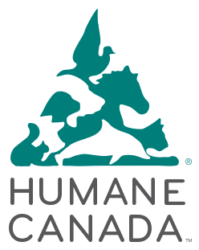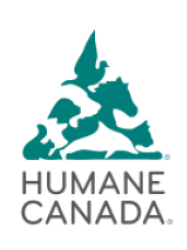Now that 2017 has come to a close, Humane Canada (also known as the Canadian Federation of Humane Societies) is once again asking: are things getting better or worse for animals in Canada?
Below, we takes a look back through 2017 and compiles the biggest stories of the year on the advances, setbacks and jaw-dropping stories of Canadian animal welfare in 2017. As a bonus, we’ve included the top international animal welfare wins. The lists appear in no particular order.

THE GOOD:
- The Senate got more animal-friendly. Despite some dicey moments, Bill S-214 and Bill S-203 progressed from the committee stage to third reading this year. Bill S-238, which aims to ban the import of shark fins, was also introduced in 2017 and is currently before the Senate Standing Committee for consultation.
- Canada’s farming industry is inching closer to ending intensive confinement. This year, we saw the start of the phase-out of cruel battery cages for hens and the introduction of rigorous, world-leading standards for cage-free housing systems. We also saw the first steps toward the ban of veal calf crates in Canada.
- Reversal of Montreal’s pit bull ban. Animal advocates across the country cheered as Valerie Plante was elected as Montreal’s new mayor on November 5. She has been following through on her promise to alter the city’s recent animal control bylaw to remove or amend breed-specific provisions.
- Focusing on owner responsibility in municipal animal bylaws. Cities across Canada, including Chateaguay, Laval, Surrey and Rankin Inlet have introduced new animal control policies for their municipalities focused on responsible pet ownership rather than short-sighted policies like BSL.
- Cetacean ban for Vancouver Aquarium. In a bold move, the Vancouver Park Board has banned the captivity of cetaceans on its park lands, effective immediately. This ban includes Stanley Park, where the Vancouver Aquarium is situated.
- New provincial cruelty legislation in PEI. After introducing a new provincial animal welfare law early in 2017, Prince Edward Island has gone from near the bottom of the list to number one in a ranking of provincial animal welfare laws.
- On May 4, an Ontario Court judge found animal advocate Anita Krajnc not guilty of criminal mischief for giving water to thirsty pigs on their way to slaughter, saying he’s not convinced a crime ever occurred.
- The Canadian Veterinary Medical Association released a new position statement on cat declawing this year, taking the stance that the surgery is ethically unacceptable and should not be performed as an elective surgery. Just before the end of the year, Nova Scotia became the first to ban the practice provincially.
- For the first time ever, a corporation has been charged with animal cruelty. More than 20 charges were laid against Chilliwack Cattle Sales and seven of its workers, and the company has been fined close to $350,000. The Crown has launched an appeal, saying the sentences should be longer.
- In a sudden change of policy direction, the government of British Columbia has announced it’s closing a much-criticized loophole in the province’s recent grizzly hunting ban. Public consultations have made it clear that killing grizzlies cannot be allowed, with the exception of First Nations people.

THE BAD:
- In a shocking development, all charges against Marineland were dropped by the Crown in the case, who said there was no reasonable possibility of conviction.
- It was discovered that infamous hoarder April Irving, who severely neglected more than 200 dogs who were living on her Milk River, Alberta property, fled Canada for Jamaica.
- Canada is falling down on its responsibility to protect wildlife. Each and every province and territory missed the deadline for submitting a caribou protection plan to the federal government, the federal government missed a 90-day deadline for endorsing updates to the Convention on International Trade in Endangered Species of Wild Fauna and Flora (CITES), and sockeye salmon counts remain much lower than expected despite years of work to implement federal protections.
- Tens of thousands of farm animals died agonizing deaths in barn fires across Canada again this year. Some of the worst happened in Abbotsford, Sarnia, Chilliwack, the Montérégie region, and Bothwell and Steinbach, Manitoba. Animal advocates are calling on the Manitoba government to reinstate the fire regulations repealed earlier this year for buildings with low human occupancy, such as barns.
- In July, following a dispute over voting rights, the Ontario SPCA suspended the Ottawa Humane Society’s affiliate status, preventing the organization from investigating animal cruelty and enforcing the law. OHS went to court to challenge the decision and ensure that Ottawa’s animals were well-protected, but the restriction remains in place.

THE UGLY:
- Abusive vet continues to practice. Dr. Mahavir Rekhi, whose license to practice veterinary medicine was temporarily suspended after the release of videos that showed him physically abusing several animals in his care, has had all charges dropped against him despite extensive video evidence.
- Hidden camera footage obtained by CTV’s W5 showed abuse and mistreatment of dogs, pigs and monkeys being used for research at ITR Laboratories Canada in the West Island region of Montreal. The claims are being investigated by the Canadian Council on Animal Care.
- More than 9,000 fish and frogs died after a power failure at a University of Alberta research lab disabled two dechlorination pumps, releasing chlorinated municipal tap water into freshwater tanks.
- The BC SPCA is recommending federal and provincial animal cruelty charges after undercover footage captured heinous abuses on a chicken farm in Chilliwack, BC.
- Twelve endangered whales die in Canadian waters. Marine mammal experts say that ship strikes and entanglement in fishing gear are to blame for the deaths of 12 critically endangered North Atlantic Right whales, who were all found dead in the Gulf of St. Lawrence throughout the summer of 2017.

INTERNATIONAL WINS:
- Smile, you’re on camera. England and France both implemented policies that require CCTV in slaughterhouses to help curb animal cruelty.
- Ringling Circus closes. After 146 years of operation, the owner of Ringling Bros. and Barnum & Bailey Circus closed the show for good in May, in part due to years of pressure from animal advocacy groups.
- Expedia is one of a growing number of travel companies that have committed to no longer selling tickets to exploitative wildlife rides and shows. The booking service has announced that it will no longer sell tickets to “activities involving certain wildlife animal interactions.”
- Days after the U.S. Fish and Wildlife Service issued a decision to lift the ban on elephant trophy imports from Zimbabwe and Zambia, President Donald Trump announced plans to reverse course.


